Vegetables need water to grow quickly, tender, and tasty. Keep the soil evenly moist throughout the growing season—that means not too wet and not too dry. If the soil dries out, vegetables can become bitter-tasting and woody. If the soil is too wet, vegetable roots can become starved for oxygen and plants can die.
Water is essential to the optimum growth of vegetables; the water content of most vegetables is nearly 90 percent. Providing the right amount of moisture to the vegetable garden is as important as supplying the right amount of plant food.
Tools for Vegetable Gardeners at Amazon:
- A.M. Leonard Straight Rake with Ash Handle
- All-Steel Nursery Spade with D-Grip Handle
- 4-Tine Spading Digging Fork with D-Handle
- Digital Soil pH Meter Outdoors Greenhouse
- Earthwise Handheld Electric Fertilizer Spreader
Water vegetables often enough to keep the soil around roots moist, but not soaking wet. As a general rule of thumb, water maturing and mature vegetables to a depth of at least 18 inches (45cm) deep. Water transplants often enough to keep leaves from wilting—so that the soil is moist from 2 to 6 inches (5-15cm) deep. Water newly planted seeds to keep the soil surface moist.
There is no secret formula for how often you should water vegetables, but as a guide maturing crops need water every 3 to 7 days during the summer, every 5 to 10 days during spring and fall, and every 7 to 14 days during the winter.
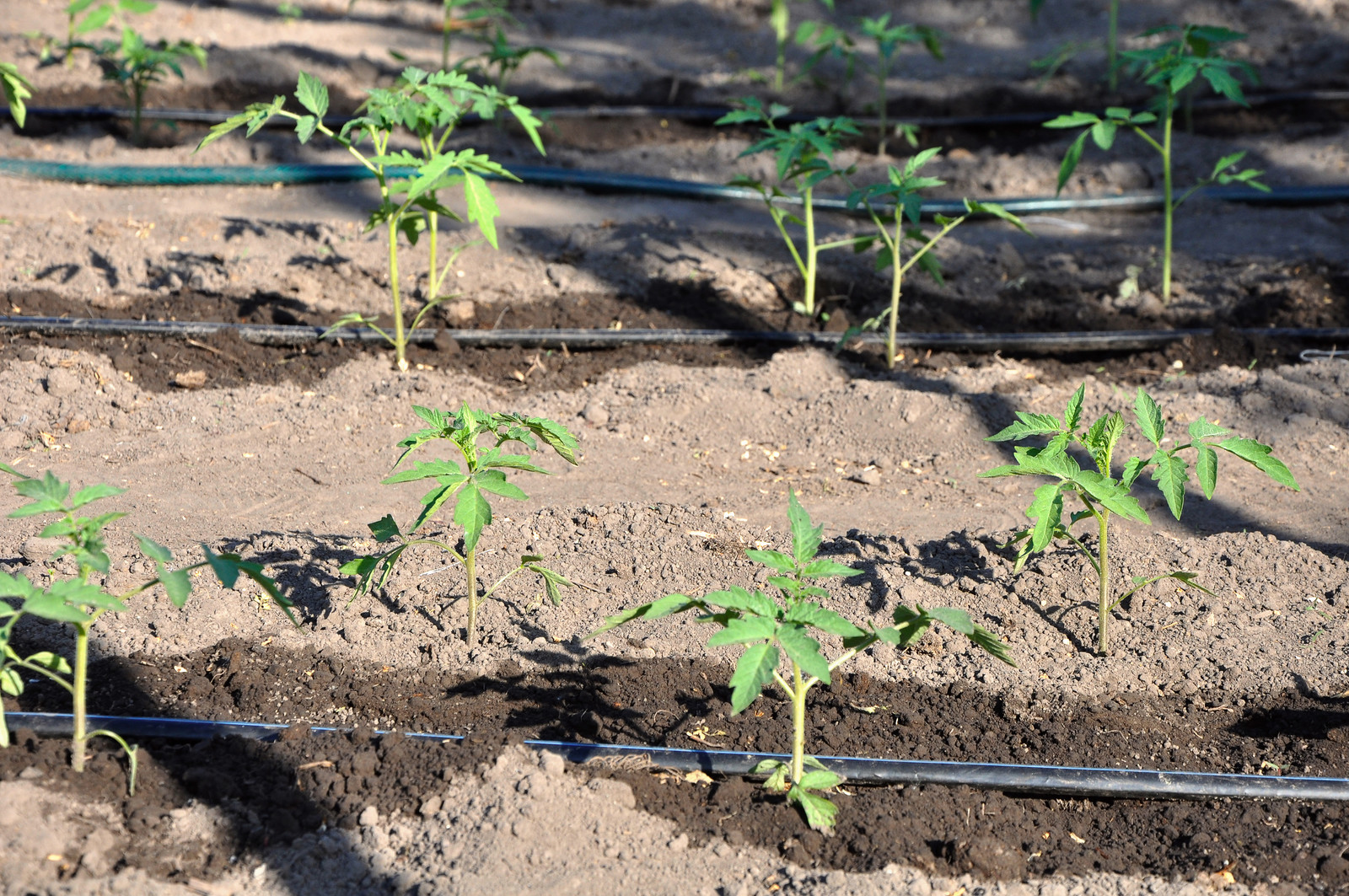
Watering and the water content of vegetables
Vegetable crops need 1 inch of water each week–as a general rule of thumb; this is the equivalent of about ½ gallon of water or slightly more per square foot of garden. Some crops need more water, and some need less.
The best vegetable crop production comes from consistent watering. It is important to avoid having vegetable plants go dry-then wet-then dry; this will cause plants to grow in stops and starts. Uneven watering can lead to uneven production and often uneven appearance and size of vegetables. Vegetables that are under-watered and come to harvest with a low water content can be bitter or tasteless.
The objective of watering vegetables is to replace the moisture lost from transpiration and soil moisture evaporation. The goal is for soil moisture to remain more or less constant–just moist, not wet or dry is optimal. Vegetables generally need the most water during mid- and late-summer and when the weather is particularly hot.
It is time to water your garden when a handful of soil squeezed into a clump falls apart when lightly touched.
One inch of water each week is the average needed to keep the soil just moist. In arid or particularly hot regions, about 2 inches of water each week is required. The amount of water may vary from ½ inch per week early in the season to more than 1 inch later in the season.
Vegetables that receive too little water (or too much water) will stop growing. When a vegetable begins to wilt from lack of water, it has already stopped growing for a day or more. (Temporary wilting of fruiting crops such as squash and cucumbers on a hot summer afternoon is not necessarily a sign of inadequate watering–this can be a sign of normal photosynthesis at its water-demanding peak.)
As each crop grows toward harvest, it is important to keep the soil evenly moist and allow the crop to attain its optimal water content–this will make for the best form, color, and taste. Underwatering can leave vegetables bitter; overwatering can leave vegetables tasteless.
Here is the percentage water content of vegetables:
- 96 percent: cucumber, butterhead lettuce, crisphead lettuce, zucchini.
- 95 percent: celery, witloof chicory, romaine lettuce, radish.
- 94 percent: Chinese cabbage, collards, endive, looseleaf lettuce, rhubarb, scallop squash, summer squash, ripe tomato.
- 93 percent: green cabbage, sweet pepper, Swiss chard, green tomato, watermelon.
- 92 percent: asparagus, beet greens, red cabbage, cauliflower, eggplant, Casba melon, mushroom, bunching onion, pumpkin, spinach, strawberry, turnip root.
- 91 percent: broccoli, savoy cabbage, mustard greens, dry onion, turnip green.
- 90 percent: green beans, honeydew melon, netted melons, okra, rutabaga.
- 89 percent: edible-podded pea, winter squash.
- 88 percent: carrot, parsley, hot pepper, Hubbard squash.
- 87 percent: beets.
- 86 percent: Brussels sprouts, butternut squash.
- 85 percent: kale.
- 84 percent: artichoke.
- 83 percent: leek.
- 80 percent: parsnip.
- 79 percent: green pea, potato.
- 77 percent: salsify.
- 76 percent: sweet corn.
- 73 percent: sweet potato.
- 70 percent: lima bean.
- 67 percent: Southern pea.
- 59 percent: garlic.
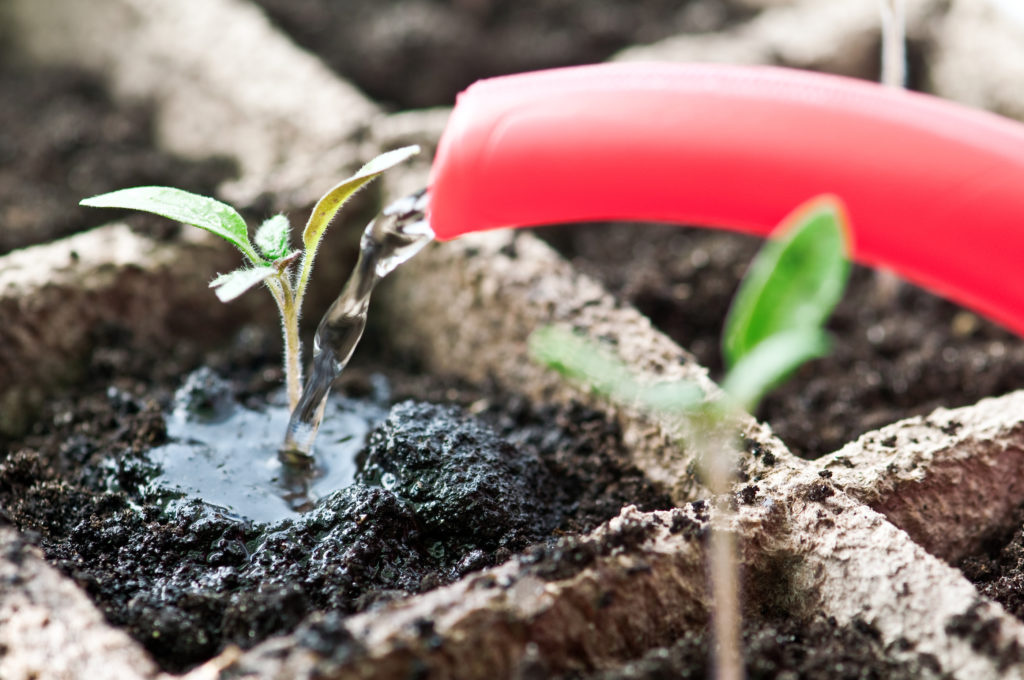
When to water seeds, seedlings, and established plants
• Seeds. Water to the age of your crops: seeds require water to germinate, and water gently and lightly after sowing the seed to enable sprouting. Water carefully at first to avoid washing away seeds just below the soil surface.
• Seedlings. Seedlings have undeveloped, shallow root systems; water seedlings lightly and frequently to help roots develop.
• Transplants. Transplants should be watered every day until they establish root systems. Regular watering will help roots recover from transplant shock. Give transplants a cupful of water each day. Water around each plant rather than watering the entire garden bed.
• Established plants. Roots follow soil moisture deep. Water to a depth of 6 inches then allows the soil to almost dry out before watering thoroughly again. Use a trowel to dig down just away from plant drip lines to see how much moisture is below the surface. You will soon get a feel for how much to water.
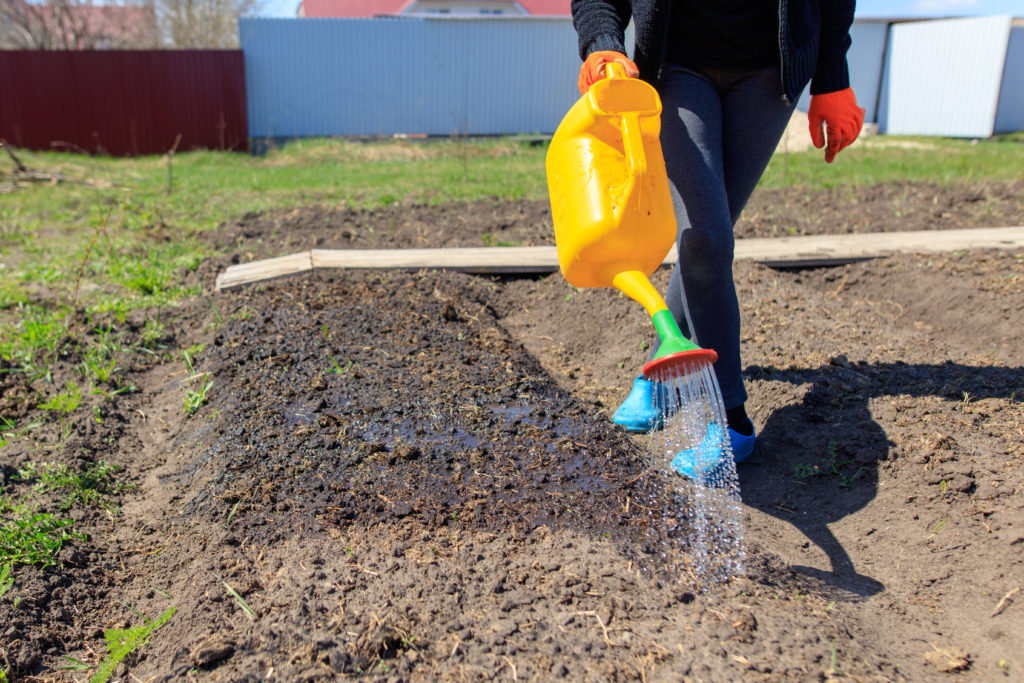
Watering times for specific crop families
• Bean family. Legumes–beans and peas–need little water until they begin flowering. Water as soon they begin to wilt. Too much water can result in lush leafy growth and a lack of flowering. Water twice a week at flowering time and then again as the pods are swelling. Stringiness in beans can be the result of insufficient moisture.
• Cabbage family. Brussels sprouts, cabbages, broccoli, and cauliflower do best when watered regularly. Give these crops a good soaking ten to twenty days before harvest.
• Corn. Corn needs heavy watering at the tasseling stage and again when the kernels are swelling.
• Fruiting crops. Fruiting crops–beans, squash, melons, cucumbers, tomatoes, peppers–require frequent watering during flowering and fruit formation. These crops are deep-rooted, however, and once the fruit has formed and begun to develop deep and less frequent watering will be sufficient.
• Leafy crops. Leafy crops are shallow-rooted and will do best with frequent light watering.
• Lettuce and greens. Lettuce spinach and other leafy crops need frequent watering but only in the top 6 inches of soil. Leafy crops are shallow-rooted. Lettuce is less bitter and spinach is slower to bolt if watered regularly.
• Onions. Members of the onion family need frequent, even watering during the early stages of growth to promote good leaf development. Continue even watering as bulbs begin to form. Once bulbs start forming onions and garlic need much less water. For less pungent onions keep them moderately moist. Stop watering when tops begin to brown and dry or ripening may be delayed.
• Potatoes. Potatoes need little water until they start to develop tubers. When tubers are marble-sized give the plants a good soaking and mulch to conserve moisture.
• Root crops. Root crops such as carrots and turnips need even moisture when young and as roots begin to develop. If the soil is allowed to get too dry, carrot roots may split and turnip centers may turn brown.
• Squash and cucumbers. Squashes, zucchini, and cucumbers need an even supply of water from flowering through fruiting. Even watering will enhance fruit development and flavor. Avoid overhead watering when these plants are flowering; pollination may be adversely affected.
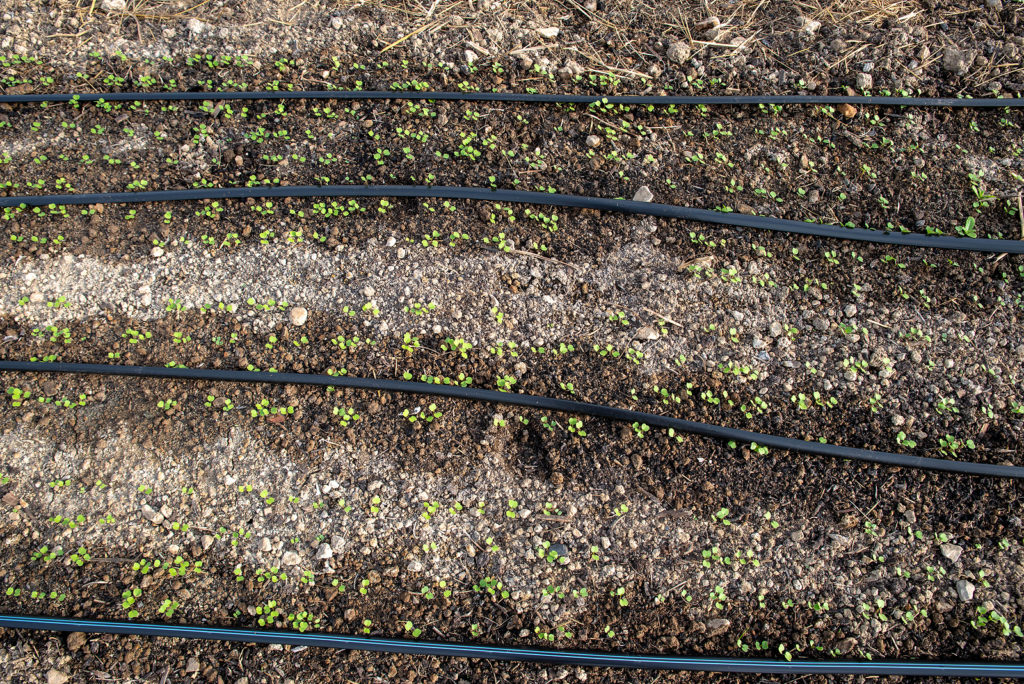
How to save water in the garden
• Keep roots moist. Water vegetables often enough to keep roots moist, but not soaking wet. Roots grow out to the plant’s drip line—the imaginary line made by rain falling off the tips of the broadest spreading branches and leaves. Most vegetable roots grow 18 to 24 inches (45-60cm) deep, some deeper. Because plants use soil moisture to take up water and food, it is important that the deepest and widest spreading roots stay moist.
As vegetables mature a shallow saucer-shaped basin at the base of each plant will ensure water is soaking down to the roots, especially in dry weather. Push up soil from outside the drip line to form a circle around the stem of each plant. Don’t dig or scrape from inside the drip line, shallow roots might be exposed or damaged.
Fill the basin with water and let it soak down into the soil; then add more water allowing it to soak in as well. Do this until the water reaches the root zone.
• Measuring water depth. Make a moisture probe from a simple metal rod ½-inch (1.2cm) in diameter and 3 feet (.9m) long with file marks at 1 foot and 2 feet. Most vegetable roots grow to a depth of 18 to 24 inches (.4-.6m). A metal rod will easily slide through moist soil; dry and rocky soil will be problematic. If your moisture probe comes away from the soil easily, you can measure the soil moisture depth.
• Water deeply. Deep watering will carry nutrients down to the roots. Soil nutrients in aged compost and dry and wet fertilizers will reach plant roots with each watering. Add fertilizers around plants midway through a deep watering session. This will prepare the soil to receive the fertilizer and send it down to the roots as you continue watering. Deep watering will also wash soil salts that damage tender plant roots deep into the soil; shallow watering often draws salts to the soil surface. (White or gray deposits on the soil surface are commonly soil salts.)
• Water early in the day. Morning is the best time of day to water vegetables. Morning water prepares plants for the stress of midday heat and allows them to grow uninterrupted. Watering wilted plants in the evening will restore wilted plants but it does not facilitate the uninterrupted, continuous growth required for the best yield. Deep watering will sustain vegetables for two or three days or more depending upon the daytime temperature. Erratic watering can stunt plant growth.
• Wilting plants. Plants that need water will droop and wilt. But plants that have been overwatered will droop too. When the soil is water-saturated oxygen will not reach roots and plants can drown. When a plant is wilted and you are not sure if it is under or over-watered, use your soil probe to check the soil moisture. Don’t assume that a wilting plant is short of water. Check the soil probe.
• Water when it is windy. Winds are drying drawing moisture from plant leaves and hastening soil moisture evaporation. When windy weather comes or is forecast, make sure vegetables are deeply watered.
• Water when it rains. Don’t assume a summer rain will soak down to plant roots. When the weather has been dry and rain follows rainwater is likely to run off the sun-crusted and hardened soil surface. Keep vegetable garden beds lightly cultivated so that rainwater easily soaks into the soil. And water after a rain if plants wilt and your soil probe says the rain did not reach the root zone. Summer humidity stimulates plant growth. If the storms pass by and don’t drop rain, make sure your crops still get the water they need.
• Don’t spray or sprinkle plants. Avoid overhead sprinkler or spray watering; some water is lost to evaporation immediately and much water falls away from plants where it is not needed. Water that drops and sits on leaves during sunny weather can result in leaf burn. Moisture that sits on leaves in cloudy or cooling weather can attract fungi spores floating through the air. Use drip irrigation, soaker hoses, bubblers, and basins around plants to deliver irrigation. Soaker hoses and bubblers can diffuse a stream of water and spread it around plant stems. Drip irrigation delivers water almost directly to plant roots.
• Drip irrigation. Drip irrigation delivers water directly to the root zone; the water will seep slowly from drip emitters into the soil a drop at a time. Almost no water is lost through evaporation or runoff. But be careful that drip emitters don’t water just in one spot. A concentrated drip can result in roots growing in tight balls. Drip irrigation should encourage uniform root growth—roots growing out in all directions. Large plants will need two or three emitters so that the water is delivered across the root zone. Place drip irrigation on top of the soil where it can be easily repaired and changed quickly for successive crops.
• Irrigation timers. Timers for drip systems, soaker hoses, and bubblers operate automatically, at regular intervals—whether the soil is wet or dry and whether plants need water or not. Use a soil probe with any irrigation system to be sure roots are getting the right amount of water. Adjust automatic irrigation timer systems to plant needs and weather. Don’t rely on a timer to get it right all of the time.
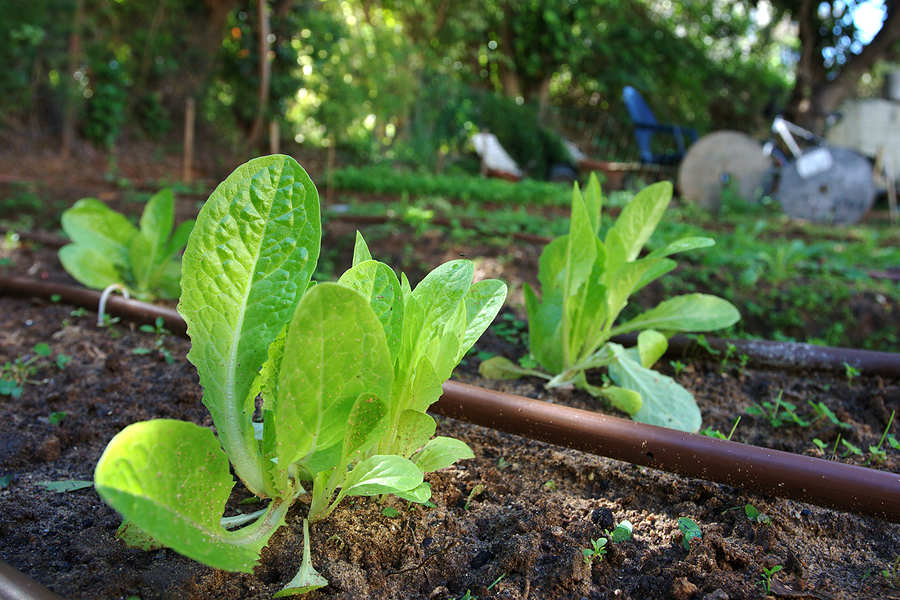
Vegetable garden watering tips
• Finger test. Your finger is a good indicator of how well-watered your vegetables are. Stick your finger down 3 to 4 inches into the soil just a few inches away from your crop. If your finger comes away dry, it’s time to water; if your finger comes away glistening wet, let the soil dry out; if your finger comes away just moist with a few flecks of damp soil–your watering is just right.
• Soil. Organic matter will increase your soil’s water-holding capacity (by as much as six times), conserve moisture, and reduce evaporation. Add one inch of aged compost to your planting beds twice a year. Work the compost into the soil before planting or add it as a top dressing or mulch during the growing season. Organic matter improves the soil structure. Organic mulches conserve moisture by reducing evaporation and also discourage weeds.
• Watering time. Water when plants need it. If crops are droopy in the morning, it’s probably time to water. Give plants a soaking before the day is too old. Avoid watering at midday or in the late afternoon when water will be quickly lost to evaporation. Where the summer is dry and hot, water at night when evaporation is lowest
• Wilting. Wilting can be an indicator that plants need water, but can also be misleading. Some plants like tomatoes, peppers, and eggplant tend to wilt slightly during the heat of the day in warm climates, even if the soil has enough moisture. Check soil moisture to avoid overwatering. If plants are wilted in the morning, water.
• Over-watering. Overwatering can be just as harmful to plants as under-watering. Too much water can create an artificial water dependency and result in too much leafy growth. Overwatering can displace soil air that plant roots need to breathe–plant roots can die from lack of air. Excessive watering can uproot plants and wash away nutrients in the soil.
• Cultivation. Lightly cultivate the soil before watering. This will allow water to soak into the soil rather than runoff. Rain, overhead irrigation, and hot baking weather can cause topsoil to form a crust. Break up the crust to capture rain and irrigation.
• Basins and furrows. Form earthen basins around large, deep-rooted plants such as tomatoes, peppers, and eggplants. A basin will help retain irrigation and rainwater. Use furrows alongside row crops to regulate the water that goes to particular plants. Use temporary damns along furrows to concentrate water delivery to plants in need.
• Mulch. Mulch around crops to slow evaporation and choke out weeds competing with vegetables for water and nutrients. Dry grass clippings, leaves, pine needles, straw, and almost any organic matter are good mulches. Be sure your mulch is free of weed seeds. Mulch after the soil has warmed in late spring and after you have given the garden its first good soaking.
• Harvest. Harvest vegetables and herbs as soon as they reach maturity. Crops taste best at the peak of ripeness. Watering vegetables that are past ripe and in decline is a waste.
Save water by adding compost to the garden
Help your garden retain moisture for the hot summer ahead by adding plenty of aged compost to your planting beds. Aged compost—rich in organic materials—has a high water-holding capacity.
You can add compost to your garden beds in two ways: the easiest is to simply “sheet compost”, that is lay a 2-inch thick layer or sheet of aged compost across the planting beds. You can do this before or after you plant. If you are adding compost to a planted bed, simply be careful to keep the compost back from plant stems. “Burying” plant stems can cause stems to rot.
Irrigation over the course of the next weeks and months will carry the compost deep into the soil adding important nutrients to the soil.
You can also turn compost into the planting beds before you plant or at the end of the season; simply spread compost across the bed and then turn the soil over once with a spade or shovel—the depth of the blade of your spade or shovel is about 12 inches.
Compost can be used as mulch when added to beds in late spring or early summer. One or two inches of compost spread across the planting bed will inhibit soil moisture evaporation and insulate the soil from getting too warm as summer heats up.
Providing the right amount of moisture to the vegetable garden is as important as supplying the right amount of plant food.
Related articles:
Water Vegetables: Critical Watering Times
Vegetable Garden Organic Pest Control
Garden Planning Books at Amazon:
- Vegetable Garden Almanac & Planner
- Kitchen Garden Grower’s Guide Vegetable Encyclopedia
- Vegetable Garden Grower’s Guide
- Tomato Grower’s Answer Book



